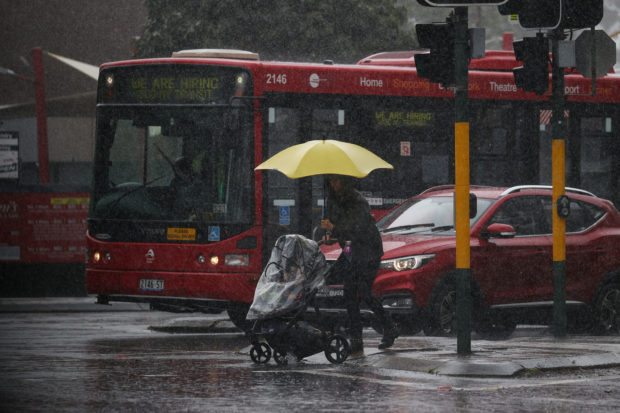Thousands in Australian inland towns flee homes amid major flood warnings

A pedestrian pushing a baby pram crosses a flooding intersection as heavy rains affect Sydney, Australia, October 6, 2022. REUTERS/Loren Elliott/File Photo
SYDNEY — Thousands of residents in several inland towns in Australia’s most populous state of New South Wales evacuated their homes overnight with more than 100 flood warnings in place on Friday after swollen rivers burst banks and neared record flood levels.
Major flooding is occurring at Forbes, a rural town in the state’s wheatbelt, with the Lachlan river expected to peak at a 70-year high later on Friday, the Bureau of Meteorology said.
Along the Murrumbidgee river at Wagga Wagga, home to about 70,000, flooding could peak soon, with levels forecast to be higher than a deluge in 2010, the bureau said.
Forbes Mayor Phyllis Miller said floodwaters were lapping against shops in the town centre and there was “a bit of panic” in the community.
“We’re okay but it’s just the unknown of where this flood will end up,” Miller told ABC Radio.
Australia’s east is in the grip of its fourth major flood crisis this year due to a multi-year La Nina weather phenomenon, typically associated with increased rainfall.
Authorities are describing the latest deluge as “blue-sky floods” as rains have eased but water continues to flow from overloaded dams and rivers.
The entire town of Forbes, with a population of over 8,000, and around 700 residents of North Wagga Wagga have been ordered to evacuate.
The government has warned that inundation of agricultural lands will trigger a rise in the prices of fruit and vegetables, inflicting more pain to families already battling soaring inflation.
Emergency crews used helicopters to winch more than 1,000 sheep to safety after the animals became trapped in a paddock near Forbes, which was slowly filling up with floodwater.
Forbes cattle farmer Charles Laverty, who has about a third of his paddocks under water, said frequent flooding has hit farming communities hard with many struggling to recover.
“A lot of (my neighbours) have given up on harvesting those areas, which is very expensive,” Laverty told the Australian Associated Press. “The losses are going to be devastating for them.”